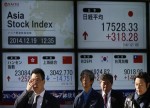
- All Instrument Types
- Indices
- Equities
- ETFs
- Funds
- Commodities
- Currencies
- Crypto
- Bonds
- Certificates
Please try another search

ETFs To Play As Dow Heads To Worst Month Since Great Depression

The Wall Street bloodbath continued on Monday after U.S. equities witnessed the worst week (ending Mar 20) since the recession of 2008 amid aggravating coronavirus concerns. The Dow Jones lost 3%, followed by the S&P 500’s and Nasdaq Composite’s decline of 2.9% and 0.3% on Mar 23. Despite the Federal Reserve’s initiative to aid the U.S. economy by committing to unlimited bond purchases, the market rout came largely due to the Senate’s second failure to advance a $1.8-trillion coronavirus stimulus package.
The Dow Jones is believed to be plummeting to its worst month since 1931. Notably, 1931 falls within the period of the worst economic crisis in the history of the United States, i.e. the Great Depression.The Dow Jones had tanked 30.7% in September 1931. It is worth noting here that the blue-chip index has already come down to its lowest level since December of 2016 after losing 26.8% in March so far (as of Mar 23). Also, the Dow Jones has witnessed the fastest pace of decline from peak to trough since 1931. It took it 19 trading sessions to enter the bear territory by plunging at least 20% from its record high level noted on Feb 12, 2020.
The rising coronavirus-led shutdowns have been escalating worries among market participants in the United States, as more than 45,000 people have tested positive and 500 have died. All states in the United States and the District of Columbia have confirmed cases of coronavirus. The rapid spread of the virus is leading to sweeping travel bans, and cancellation of large events as well as shutting down of schools, colleges, universities, restaurants and bars and shopping malls. In such a scenario, slowing global economic growth looks inevitable. JPMorgan (NYSE:JPM) estimates that a recession will hit the U.S. and European economies by this July. According to the financial services company, the U.S. economy might shrink 2% in the first quarter and 3% in the second (read: Coronavirus Panic to Send Economy Into Recession: ETF Picks).
In such a scenario, investors can take a look at the following ETF areas to combat the ongoing coronavirus crisis:
Treasury ETFs
Investors’ risk-off sentiments, along with the global stimulus packages, in order to protect the economy from the rapidly-aggravating coronavirus outbreak has sparked a huge rally in Treasuries. As such, investors can tap the opportunity by going long on this instrument with the help of ETFs like iShares 20+ Year Treasury Bond (NASDAQ:TLT) ETF (NZ:TLT) , iShares 7-10 Year Treasury Bond (NYSE:IEF) ETF IEF, iShares Short Treasury Bond ETF (ASX:SHV) , iShares 1-3 Year Treasury Bond ETF SHY and iShares U.S. Treasury Bond ETF GOVT (read: Bears Grip Market: 5 Safe ETF Investing Zones).
Inverse ETFs
The virus-induced volatility is spurring demand for inverse or inverse-leveraged ETFs. These products either create a short position or a leveraged short position in the underlying index through the use of swaps, options, future contracts and other financial instruments. Due to their compounding impact, investors can earn higher returns in a shorter period of time, provided the trend remains favorable. However, these funds run the risk of huge losses compared with traditional funds in fluctuating markets. So, investors intending to play against the tumbling Dow Jones might tap ProShares Short Dow 30 DOG, ProSharesUltraShort Dow30 DXD and ProSharesUltraPro Short Dow30 SDOW (read: Coronavirus Triggers Market Bloodbath: 7 Hot Inverse ETF Areas).
Consumer Staple ETFs
This non-cyclical sector is likely to be less hammered by any market crash. The sector can emerge as a true safe haven amid the current crisis as even people on self-quarantine need daily essentials. Investors can consider The Consumer Staples Select Sector SPDR Fund XLP, Vanguard Consumer Staples ETF VDC, iShares U.S. Consumer Goods ETF IYK and Invesco S&P 500 Equal Weight Consumer Staples ETF RHS (read: Beat Virus With 2 Sector ETFs & Stocks That Survived 2008 Crisis).
Want key ETF info delivered straight to your inbox?
Zacks’ free Fund Newsletter will brief you on top news and analysis, as well as top-performing ETFs, each week. Get it free >>
iShares 20+ Year Treasury Bond ETF (TLT): ETF Research Reports
Consumer Staples Select Sector SPDR ETF (NYSE:XLP): ETF Research Reports
iShares 7-10 Year Treasury Bond ETF (IEF): ETF Research Reports
Invesco S&P 500 Equal Weight Consumer Staples ETF (RHS): ETF Research Reports
iShares U.S. Treasury Bond ETF (GOVT): ETF Research Reports
Proshares Short Dow30 (DOG): ETF Research Reports
Vanguard Consumer Staples ETF (VDC): ETF Research Reports
iShares Short Treasury Bond ETF (SHV): ETF Research Reports
ProShares UltraPro Short Dow30 (SDOW): ETF Research Reports
iShares U.S. Consumer Goods ETF (IYK): ETF Research Reports
iShares 1-3 Year Treasury Bond ETF (SHY): ETF Research Reports
ProShares UltraShort Dow30 (DXD): ETF Research Reports
Original post
Zacks Investment Research
Related Articles

Shares of Caesars Entertainment (NASDAQ:CZR), a leading gambling stock, traded around 3% higher on Wednesday morning, though the stock was trading around 1.5% lower shortly before...

Amazon (NASDAQ:AMZN) is making a significant push into the future with a robust investment in robotics and artificial intelligence. The company has earmarked $35 billion for...

Home Depot’s (NYSE:HD) Q4 2024 report and guidance for 2025 have plenty to be unhappy about, but the simple truth is that this company turned a corner in 2024. It is on track for...
Are you sure you want to block %USER_NAME%?
By doing so, you and %USER_NAME% will not be able to see any of each other's Investing.com's posts.
%USER_NAME% was successfully added to your Block List
Since you’ve just unblocked this person, you must wait 48 hours before renewing the block.
I feel that this comment is:
Thank You!
Your report has been sent to our moderators for review





Add a Comment
We encourage you to use comments to engage with other users, share your perspective and ask questions of authors and each other. However, in order to maintain the high level of discourse we’ve all come to value and expect, please keep the following criteria in mind:
Enrich the conversation, don’t trash it.
Stay focused and on track. Only post material that’s relevant to the topic being discussed.
Be respectful. Even negative opinions can be framed positively and diplomatically. Avoid profanity, slander or personal attacks directed at an author or another user. Racism, sexism and other forms of discrimination will not be tolerated.
Perpetrators of spam or abuse will be deleted from the site and prohibited from future registration at Investing.com’s discretion.